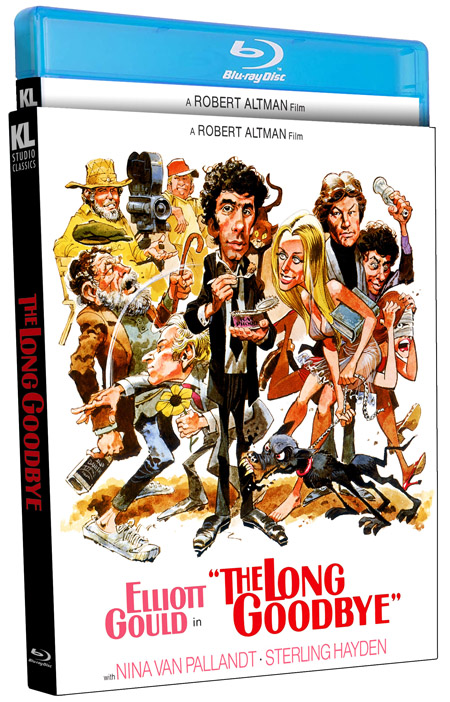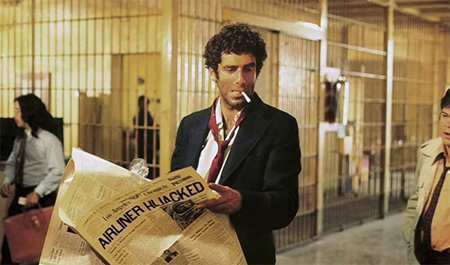
RIP VAN MARLOWE
By Raymond Benson
(Note:
Portions of this review appeared on Cinema Retro in 2014 for an earlier
Kino Lorber edition.)
Robert
Altman was a very quirky director, sometimes missing the mark, but oftentimes
brilliant. His 1973 take on Raymond Chandler’s 1953 novel The Long Goodbye is a case in point. It might take a second viewing
to appreciate what’s really going on in the film. Updating what is essentially
a 1940s film noir character to the
swinging 70s was a risky and challenging prospect—and Altman and his star,
Elliott Gould as Philip Marlowe (!), pull it off.
It’s
one of those pictures that critics hated when it was first released; and yet,
by the end of the year, it was being named on several Top Ten lists. I admit
that when I first saw it in 1973, I didn’t much care for it. I still wasn’t
totally in tune with the kinds of movies Altman made—even after M*A*S*H, Brewster McCloud (an underrated gem), and McCabe & Mrs. Miller. But I saw it again a few years later on a
college campus and totally dug it. Altman made oddball films, and either you
went with the flow or you would be put off by the improvisational, sometimes
sloppy mise-en-scène that the director used. And the sound—well, Altman is
infamous for his overlapping dialogue (one critic called it “Altman Soupâ€). If
you didn’t “get†what the director was doing with sound, then you would
certainly have a hard time with his pictures.
Yes,
Elliott Gould plays Philip Marlowe. A very different interpretation than
Humphrey Bogart or Dick Powell, obviously. And yet, it works. Gould displays
the right amount of bemused cynicism, as if he had been asleep for twenty years
and suddenly woken up in the 1970s. And that’s exactly how Altman, screenwriter
Leigh Brackett (who co-wrote the 1946 The
Big Sleep), and Gould approached the material. Altman, in a documentary
extra on the making of the film, called the character “Rip Van Marlowe.†He is
an anachronism in a different time. For example, Marlowe can’t help but be
bewildered by the quartet of exhibitionist hippie lesbians that live in his
apartment complex. And he still drives a car from his original era. And therein
lies the point of the picture—this is a comment on the 70s, not the 40s or 50s.
The
plot concerns the possible murder of the wife of Marlowe’s good friend, Terry
(played by baseball pro Jim Boutin), who is indeed a suspect, as well as a
suitcase of missing money belonging to a vicious gangster (extrovertly portrayed
by film director Mark Rydell), an Ernest Hemingway-like writer who has gone
missing (eccentrically performed by Sterling Hayden), and the author’s hot
blonde wife who may know more than she’s telling (honestly played by newcomer
Nina van Pallandt). The story twists, turns, hits some bumps in the road, and
finally circles back to the initial beginning mystery.
It
may not be one of Altman’s best films, but it’s one of the better ones. It’s
certainly one of the more interesting experiments he tried in his most prolific
period of the 70s.

Kino
Lorber already put out a Blu-ray release several years ago, but it didn’t
really improve much on the original DVD release prior to that. The company has
now re-issued the film in a brand new 4K master that is a vast step-up from the
previous release. It looks great. The soft focus cinematography by Vilmos Zsigmond
is no longer a hazy gaze but is instead a crystal transfer of that distinctive
1970s film stock imagery. The movie now comes with an informative audio
commentary by film historian Tim Lucas.
Some
of the extras are ported over from the previous Kino Lorber release, such as
the aforementioned “making of†documentary, a short piece on Zsigmond, an
animated reproduction of a vintage American
Cinematographer article, the trailer, and a few radio spots. New to this
edition are featurettes with film historian/critic David Thompson on Altman and
the film, author Tom Williams on Raymond Chandler, and author/historian Maxim
Jakubowski on hard-boiled fiction in general. There is also a “Trailers from
Hell†segment with Josh Olson.
If
you’re an Altman fan and don’t already own the out of print DVD or previous
Blu-ray, you may want to pick up the new, improved The Long Goodbye. It
probably won’t be long before this, too, like Philip Marlowe himself, is a rare
collector’s item.
CLICK HERE TO ORDER
(Note: It has just been announced that "The Long Goodbye" has been named to America's National Film Registry of classic motion pictures.)